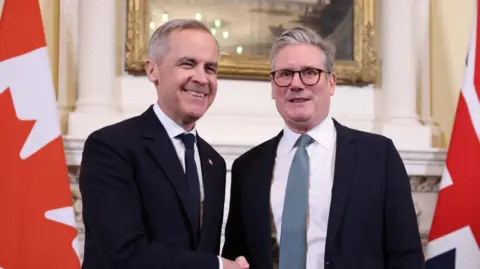In a recent development within the realm of international relations, Sir Keir Starmer, the leader of the UK Labour Party, is set to embark on an official visit to Canada. Starmer’s trip comes as he prepares for crucial discussions on security and trade with Mark Carney, the former Governor of the Bank of England, who now holds the esteemed position of Prime Minister of Canada since March. Their meeting is scheduled for Saturday evening in Ottawa, just before the commencement of the G7 summit in Alberta, which Carney will host.
This meeting marks a significant occasion as it will be the first face-to-face interaction among world leaders following the heightened tensions arising from recent Israeli strikes on Iran. Security and trade are expected to be pivotal topics on the agenda during the discussions between the two prime ministers. Carney’s office has emphasized the intent behind these talks: to strengthen what has historically been a robust economic and security partnership between the United Kingdom and Canada.
Notably, the backdrop of these negotiations includes prior discussions regarding a trade agreement that faltered early last year. Disagreements over agricultural products like beef and cheese contributed to the breakdown of those negotiations, which occurred prior to the British general election. Despite some follow-up communications, reports from Whitehall indicate that recent conversations have lacked sincerity or substantial progress, instead being described as “not in earnest.”
As international trade dynamics shift, with the UK eager to highlight its recent agreements with the European Union, India, and the United States amid economic volatility, Starmer’s administration is keen to demonstrate its proactive stance on global partnerships. The political backdrop is further complicated by the return of former President Donald Trump to the U.S. political scene.
Starmer and Carney also present contrasting viewpoints regarding President Trump and his administration. Starmer has, at times, faced criticisms for what some perceive as an overly congenial approach towards Trump, whereas Carney has been notably assertive in refuting Trump’s characterization of Canada as “America’s 51st state.” The Canadian Prime Minister’s discontent regarding Starmer’s invitation to Trump for a state visit during delicate discussions surrounding Canada’s sovereignty highlights the complexities of their diplomatic relations.
After their initial discussions in Ottawa, Starmer and Carney will move on to Kananaskis in Alberta for the G7 summit. Here, they will join other world leaders, including Trump, and the heads of state from France, Italy, Japan, Germany, and the European Union, for a three-day summit focused on critical issues, where Ukraine’s President Volodymyr Zelenskyy will also be in attendance.
The backdrop of these discussions and summits illustrates a larger narrative of geopolitical tensions, economic challenges, and scrutinized international alliances. As leaders gather to navigate these intricate relationships and pressing global issues, the outcomes of such meetings could have lasting implications not only for the UK and Canada but also for the international community at large.
In sum, the engagement between Starmer and Carney signifies a notable attempt to rebuild and fortify relations amid economic uncertainties and political challenges. The anticipated discussions underline the importance of international cooperation in addressing security, economic growth, and the broader geopolitical landscape, illustrating how diplomatic relations are navigated in a time of global complexity.



